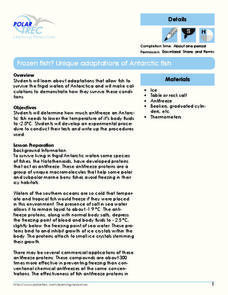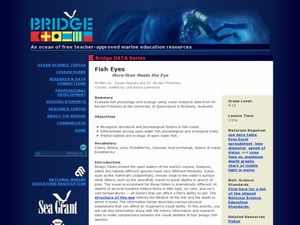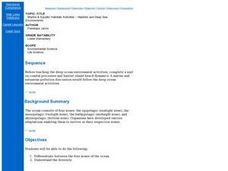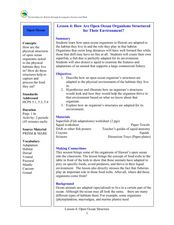Curated OER
Ocean Exploration
Young scholars explore whales. In this animal adaptation and whale instructional activity, students access prior knowledge about whales from previous lessons, then use background knowledge to predict the eating strategies of a baleen...
Curated OER
Blue Planet: Frozen Seas
Learners study the animals from the Arctic and how they have adapted. In this ocean lesson plan students create a poster about their given animal and present it to the class.
NOAA
Ocean Zones
How can organisms light up in water? Bioluminescence is light produced in a chemical reaction that can occur in an organism's body. First, learners determine what happens to light/color as you move into the deep ocean. In groups, they...
Curated OER
Plankton in the Air
Here is a lab activity adequate for use with any full lesson on environmental factors that shape animal adaptations or marine animal characteristics. Pupils will discuss the role plankton plays in the environment and filter-feeding...
Polar Trec
Frozen Fish? Unique Adaptations of Antarctic Fish
Some fish contain proteins that act like antifreeze in order for them to live in the frigid waters of Antarctica! High schoolers determine how much antifreeze a fish needs to lower its body temp to -2.5 degrees. Teachers act as a...
Curated OER
Habitats and Adaptations
Young scholars research and describe the habitat and adaptations of a reef animal. After the student is assigned a habitat, they design and draw a cresture adapted to eat each food and to live in each habitat.
Curated OER
Marine Animal and Plant Adaptations
Students examine nature by creating their own animals. In this animal adaptation activity, students define scientific vocabulary terms dealing with adaptation such as sea stars, sea cucumbers and exoskeleton. Students utilize their...
Curated OER
Fish Eyes - More than Meets the Eye
Inform your class about the adaptations in fish eyes: cones, lens size, endothermy, and speed of vision. The adaptations are related to diving behavior. Junior marine scientists compare the adaptations of four different fish species to...
University of Southern California
What Lives In The Ocean?
One of the most diverse environments on Earth is the ocean. Young scientists explore the living things found in the ocean during an exciting seven-lesson unit. Their study includes organisms from plankton to invertebrates...
Lerner Publishing
Teaching Habitats
What makes up a habitat? Use this resource to engage first graders in the exploration of desert, wetland, forest, and ocean habitats. Youngsters classify plants and animals into the four distinct habitats through drawings and cutting and...
Curated OER
Under the Sea
Students imagine and describe fictitious sea animals that might live in the ocean. After reading an article, they reflect on new discoveries found in the ocean recently. Using the internet, they research the interdependence of animals...
US Environmental Protection Agency
Carbon Through the Seasons
Meteorologists view an animated video by the Environmental Protection Agency to learn how the carbon cycle works, and then move into groups to analyze and graph actual data of the atmospheric carbon dioxide concentration from Hawaii's...
Curated OER
Frozen Seas
Students research animal life in the frozen seas. In this researched based lesson, students use the Internet to create a poster about an animal that lives in an Arctic or Antarctic environment. Students will focus on the behavioral and...
Curated OER
Oceans All Over
Young scholars identify the locations and names of the world's oceans. They draw and label a round piece of fruit and answer discussion questions.
Teacher Printables
My Report Pack for. . .
Here is a handy guide for putting together a research report on birds, or on a selection of other topics (see the added materials.). Individuals are guided to think of three questions about their topic, they narrow down subtopics, use a...
Curated OER
Habitats and Deep Sea Environments
Students examine and identify the characteristics of the four zones of the ocean. They discover the amount of diversity in marine habitats. They also explore the adaptations organisms have that have allowed them to survive.
University of Southern California
What Is The Ocean?
Go on a tour of the ocean through the lens of a scientist. Learners read maps of the ocean floor, study tide behavior, examine wave motion, and analyze components of soil. Each lesson incorporates a hands-on component.
Curated OER
In The Zone
Third graders identify ways that ocean animals grow, survive, reproduce, and adapt. They use computer Internet skills to acces and collect information. They create a PowerPoint presentation. They demonstrate writing skills throughthe...
Curated OER
How Are Open Ocean Organisms Structured for Their Environment?
Students explore biology by conducting an animal dissection. In this oceanography lesson, students identify the life cycle of a squid and other animals that are involved with commercial fishing. Students dissect a squid in class and...
Curated OER
Hawaii's Freshwater Animals - Species Report
Students explore biology by creating a report for the class. In this oceanography lesson, students research and identify the survival characteristics of a list of freshwater animals by utilizing the Internet and library. Students...
Curated OER
Creatures of the Sea
Fourth graders complete a two-month long unit on the physical characteristics of the oceans and animal environments. They create a "Creatures of the Sea" alphabet book in collaboration with a kindergarten class, conduct Internet...
BrainPOP
Latitude and Longitude Differentiated Lesson Plan
Scholars warm-up their map skills with a discussion using location words to describe familiar places. An engaging video informs class members about latitude and longitude. Three leveled activities extend the learning experience for...
Curated OER
Nature Superfish
Students study the behavior or ocean animals called billfish. In this life science lesson, students create their own documentary about a local animal. They share their videos with the entire school.
Curated OER
The Intertidal Zone
Learners research the diverse animal and plant life that inhabit the intertidal zones along the Pacific rocky coast. As students progress through this lesson, they begin to recognize distinct behaviors, adaptations, and characteristics...

























